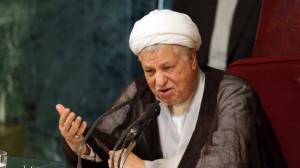 Chairman of Iran�s Expediency Council Ayatollah Ali Akbar Hashemi Rafsanjani (shown) has not been approved to run for president in Iran�s July 14th election.[/caption]
Chairman of Iran�s Expediency Council Ayatollah Ali Akbar Hashemi Rafsanjani (shown) has not been approved to run for president in Iran�s July 14th election.[/caption]Chairman of Iran�s Expediency Council Ayatollah Akbar Hashemi Rafsanjani has described as �very cruel� the US-led sanctions against the Islamic Republic that have resulted in the shortage of medicine and health risks to patients in the country.
�The situation of patients and their families is worrisome and upsetting, [especially] when we hear that, in addition to the miseries of the illness, they have difficulty finding medication as well,� said Ayatollah Hashemi Rafsanjani in a Wednesday meeting with members of the Board of Directors of the Iranian Association of Pharmacists.
The top Iranian official said, �Under false pretexts and sometimes by relying on the words and deeds of extremists, the [so-called] advocates of human rights cause suffering to the [Iranian] people, in particular the patients, which does not conform to any human principles.�
Although the US-led sanctions imposed on Iran do not directly ban selling medicine and medical supplies to Iran, the sanctions on Iran�s banking sector have effectively hindered the import of medicine to the country through obligating the importers of medicine to Iran to apply for special licenses. The cumbersome process has dissuaded many of the importing companies. As a result, the lives of many Iranian patients suffering from special diseases such as thalassemia, hemophilia, hepatitis, multiple sclerosis, diabetes, etc., have been put at stake.
In an October report to the UN General Assembly, Secretary General Ban Ki-moon warned that the Western embargoes against Iran have mainly targeted the livelihood of the ordinary Iranian population, including patients.
�The sanctions imposed on the Islamic Republic of Iran have had significant effects on the general population, including an escalation in inflation, a rise in commodities and energy costs, an increase in the rate of unemployment and a shortage of necessary items, including medicine," the UN chief said on October 6.
The United States and the European Union have imposed sanctions on Iran�s oil and financial sectors aimed at preventing other countries from purchasing Iranian oil and conducting transactions with the Central Bank of Iran.
The illegal US-engineered sanctions have been imposed based on the accusation that Iran is pursuing non-civilian objectives in its nuclear energy program.
Iran rejects the allegation, arguing that as a committed signatory to the nuclear Non-Proliferation Treaty (NPT) and a member of the International Atomic Energy Agency (IAEA), it has the right to use nuclear technology for peaceful purposes.
By Press TV
The Iran Project is not responsible for the content of quoted articles.










